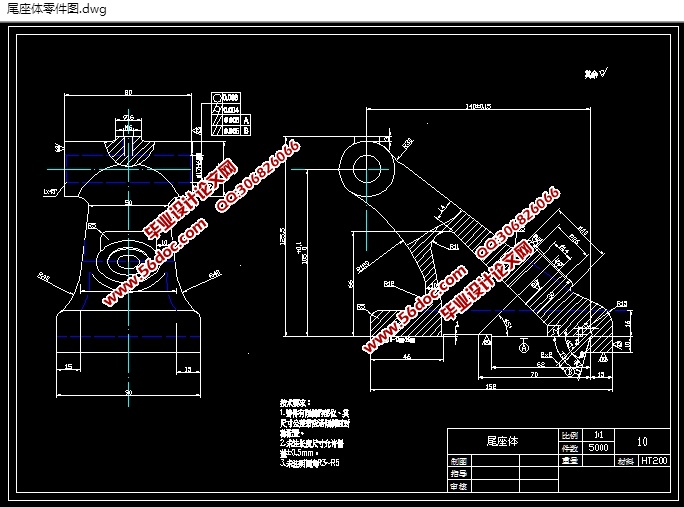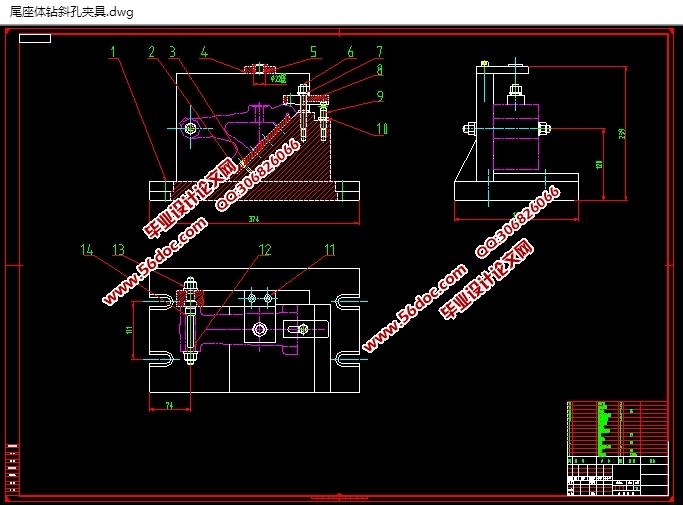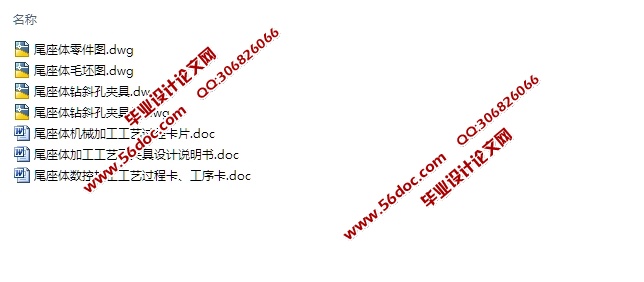尾座体加工工艺及夹具设计(含CAD零件图夹具图,工艺卡工序卡)(论文说明书10000字,CAD图纸4张,工艺卡,工序卡)
摘 要
在生产过程中,使生产对象(原材料,毛坯,零件或总成等)的质和量的状态发生直接变化的过程叫工艺过程,如毛坯制造,机械加工,热处理,装配等都称之为工艺过程。在制定工艺过程中,要确定各工序的安装工位和该工序需要的工步,加工该工序的机车及机床的进给量,切削深度,主轴转速和切削速度,该工序的夹具,刀具及量具,还有走刀次数和走刀长度,最后计算该工序的基本时间,辅助时间和工作地服务时间。
关键词:工序,工位,工步,加工余量,定位方案,夹紧力
Abstract
Enable producing the target in process of production (raw materials, the blank , state of quality and quantity on part become always ) take place direct course of change ask craft course, if the blank is made, machining, heat treatment , assemble etc. and call it the craft course. In the course of making the craft , is it confirm every erector location and worker step that process need this of process to want, the locomotive of processing , this process , and the entering the giving amount of the lathe, cut depth , the rotational speed of the main shaft and speed of cutting, the jig of this process, the cutter and measuring tool, a one hundred sheets of number of times still leaves and a one hundred sheets of length leaves, calculate basic time of this process , auxiliary time and service time of place of working finally.
Keywords:The process, worker one, worker's step , the surplus of processing, orient the scheme , clamp strength
尾座体零件技术要求:
零件图上的主要技术要求为:表面粗糙度要求见附图(尾座体),未标注圆角R2-R3。
1.2. 零件的材料:
由零件蓝图要求支架零件材料选择HT200。此材料为灰铸铁(也叫灰口铸铁),最小抗拉强度150属于中强度铸铁件,铸造性能好,工艺简单,铸造应力小,可不用人工时效;有一定机械强度和良好的减震性。适用于制造承受中等应力的零件,在弱腐蚀环境工作的零件。
1.3.选择毛坯的原则:
1.3.1零件毛坯的选择:
机械零件的制造包括毛坯成形和切削加工两个阶段,毛坯成形不仅对后续的切削加工产生很大的影响,而且对零件乃至机械产品的质量、使用性能、生产周期和成本都有影响。因此正确选择毛坯的类型和生产方法具有重要的意义。
零件采用HT200材料等常采用铸造成型成形。但采用数控加工已成为复杂件、单批生产的重要成形方法。数控加工段造、铸造件方法适用于制造受力较大,如转轴、底座固定座等。通常,零件的材料一旦确定,其毛坯成形方法也大致确定了。



目 录
摘要……………………………………………………………………………………………4
绪论……………………………………………………………………………………………6
1、零件的分析……………………………………………………………..…………....7
1.1、零件的作用……………………………………………………………………………7
1.2、零件的技术要求…………………………………………………..7
2、确定毛坯、画毛坯—零件合图……………………………….12
2.1、确定毛胚的制造形式及材料……………………………………..12
2.2、机械加工余量、工序尺寸及毛坯尺寸的确定…………………..13
2.3、选择加工设备及刀、夹、量具……………………………………13
3、工艺规程设计…………………………………………………….17
3.1、定位基准的选择……………………………………………….....17
3.2、定位元件………………………………………………….. ……..17
3.3、切削力及夹紧力的计算…………………………………. ………18
3.4加工工序设计…………………………………………………………………….19
5、钻斜孔夹具的设计………………………………………………....................20
5.1定位基准的选择…………………………………………………….20
5.2切削力的计算与夹紧力分析……………………………………….20
5.3夹紧元件及动力装置确定………………………………………….21
5.4夹紧装置的设计…………………………………………………….22
5.5夹具操作的简要说明……………………………………………….23
小结…………………………………………………………………………………………....24
致谢………………………………………………………………………………………........25
参考文献……………………………………………………………………………………26
|







